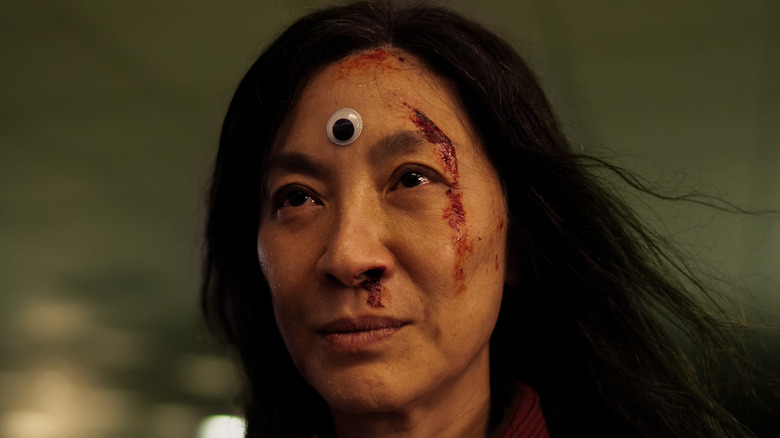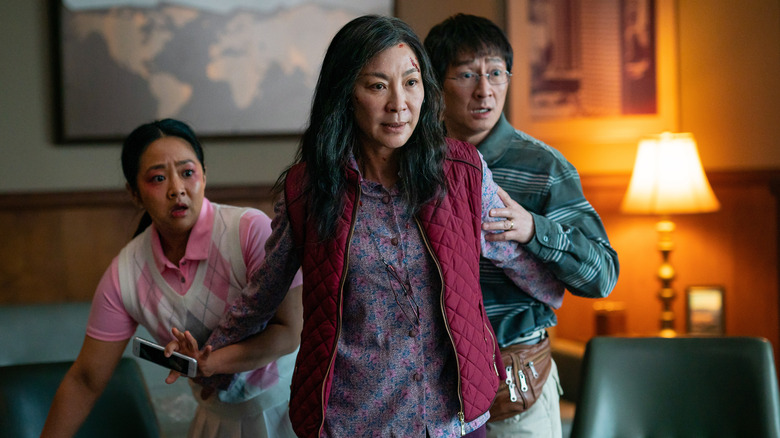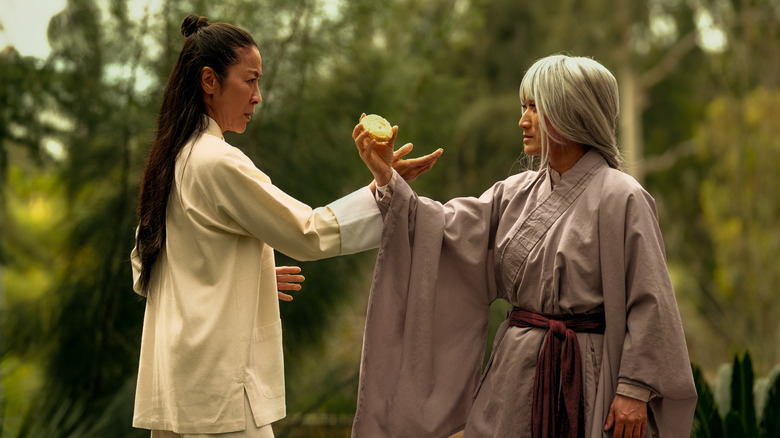Everything Everywhere All At Once Review: Multiversal Majesty
There's a specific cadence that tends to plague movies presenting themselves first and foremost as "genre mishmash." Particularly in the independent film scene, trying to split the distance between something straightforward and emotionally affecting with something involving, say, time travel or heavily choreographed martial arts often leaves one extreme or the other feeling shoehorned into the mix. Either the drama will be cheap and flat and lacking in any nuance or texture, or the more fantastical elements will be drenched in so much irony they may as well not be present at all.
But that's one of the many reasons "Everything Everywhere All at Once" is such an astonishing picture. At a time when the cinematic marketplace is more polarized than ever, with most genre exploration reserved for mega-budget studio tentpoles and more stirring portraits of the human experience relegated to streaming or the occasional arthouse breakthrough, filmmaking duo Daniels have accomplished the enviable feat of creating a movie that's as startling in its originality as it is comforting in its surprising familiarity. It is, without question, one of the finest movies made stateside in a long, long time, and no amount of hyperbole from overenthusiastic fans of the film will be able to sour new viewers on the finished product.
The film is difficult to explain without in some way spoiling the viewing experience. if you can manage to find a fully spoiler-free review, you'll likely have to crawl a mountain of glass shards with words like "maximalist," "ambitious," and "phantasmagoric" used liberally in lieu of revealing any of the film's many twists, turns, and reveals. But at its core, "Everything Everywhere All at Once" is a picture about life and love and generational trauma and familial ties and the cosmos and somehow also kung-fu and bagels and ... it's a lot.
So, while it would be preferable, if at all possible, to go into the film blind, we will try to expand upon its rich mythology and dense storytelling without sullying seeing the film for yourself.
'Sliding Doors' on DRUGS
For roughly the first 20 minutes of "Everything Everywhere All at Once," you could be forgiven for assuming the film you are watching is going to be a tense family drama designed to deliver as many in-audience panic attacks as humanly possible. The roughly ten-minute opening scene introduces Evelyn (Michelle Yeoh), a laundromat owner stretched thin between her obligations to her ailing, disapproving father Gong Gong (James Hong), her perpetual consternation at her idealistic husband Waymond (Ke Huay Quan), and her fraught relationship with her daughter Joy (Stephanie Hsu), a young lesbian who just wants her mother to stop hiding her sexual orientation from her grandfather. The claustrophobic shape of the laundromat and the attached living quarters coupled with the frenetic pace proves roughly as stressful as "Uncut Gems," but all the place-setting is sprinkled with enough oddities that we can tell something else is afoot.
Some of that unease just comes from the staging and the camera movements, but the use of reflections in the background further implies the shape of the picture to come. But that balance between the domestic drama before us and the bizarre world-bending hinted at in the background is perfectly calibrated. Watching Waymond struggle to present his wife with divorce papers is engrossing enough to maybe not notice security camera footage of him hopping and flying across the laundromat like a trapeze artist. Wrestling with the ticking time clock of the tax audit the business must undergo with the fearsome IRS inspector Deirdre (Jamie Lee Curtis) might be enough to make even a viewer who loved the film's spoiler-y trailer forget what lies in store.
But when Evelyn hits a breaking point on the way to this tax audit, an elevator ride changes her life — and the future of the cosmos — forever.
Waymond seemingly freezes time and, through an incredibly quirky display that screams Michel Gondry or Terry Gilliam, uses an umbrella, a bluetooth earpiece, and a hyper-dense exposition dump to show Evelyn an ornate and disorienting flashing of her entire life before her very eyes. He leaves her with a set of inscrutable instructions, an ultimatum about the fate of the multiverse and a reminder not to talk to anyone, not even himself, because he won't know what she's talking about.
In the next few scenes, Evelyn, at capacity with the stressors of her life, takes the archetypal leap of faith and is thrust into an inexplicable adventure with the other Waymond, an iteration of her husband from an alternate universe. In that world, Evelyn was the woman who discovered the multiverse, with their world being the Alpha strand that made first contact with other strands. But that Evelyn is dead, and this Waymond needs this Evelyn's help in defeating Jobu Tupaki, an interdimensional threat hunting Evelyns across the multiverse with chaotic, genocidal intent.
What follows is a delirious, harrowing, and often confounding journey through multiple universes, with each one pushing Evelyn to confront what might have been in her life. She must draw from the strength and prowess of other Evelyns to grow stronger, but can't allow herself to be tempted by the siren song of greener grass, lest she literally, mentally combust.
But that's just scraping the surface.
Across the Multiverse
On a purely entertainment level, Dan Kwan and Daniel Scheinert (credited together as Daniels) have crafted a movie that is leagues more thrilling, more inventive, and more breathtaking to behold than most movies with ten times the budget. If the only thing they accomplished was finding a fun new way to necessitate inspired action choreography, cool fight scenes, and mind-bending science fiction concepts, "Everything Everywhere" would still be a major home run.
It takes a fair bit of screen time to properly outline each of the movie's important bits of mythology, like the logistics of how Evelyn is able to "download" the skillsets of alternate Evelyns by doing statistically improbable things to unlock a pathway to that specific universe. This opens the door for scenes like alternate Waymond giving himself an uncomfortable number of paper cuts to become a skilled gymnast, or Evelyn making a mistake in finding her path and accidentally finding herself in a universe where everyone has hot dogs for fingers.
The inherent absurdity of the universe's rules allows for the film to be relentlessly comedic, even as the themes and narrative shift further into emotionally distressing territory. Though live-action, the movie plays in a similar wheelhouse to a lot of great animation, treating the strictures of reality like so much Bubble Yum to stretch and contort in order to reach a memorable catharsis. It somehow strikes a balance between the iconic pop art of "The Matrix" and the arch-ambitions of Charlie Kaufman's "Synecdoche, NY."
But the film goes so much further than just being funny and zany and action-packed. Without going too deep into the central conflict or revealing more than necessary, everything in this outsized story, with its epic scale and exponentially more intricate narrative wrinkles, is built upon a foundation exploring very intimate relationships.
It can be cliche in some anime or other genre-bending stories that "the power of love" can save the universe, but "Everything Everywhere" explores that idea in a much thornier, messier way, making the resulting climax all the more well-earned because it never feels like something this expansive is being wrapped up with a convenient bow. It is a movie that wrestles with the chaos and pain of existence while winking and joking and soothing with all the bells and whistles of movie magic.
Setting aside all the filmmaking prowess on display, the movie really lives or dies by its performances, and the family unit at the center of its tale could not have been better cast. Michelle Yeoh is a stunner in perhaps the meatiest, showiest role she's had in ages, carrying so much of the film's weight on her shoulders. James Hong is similarly, reliably excellent in his role as the prickly father figure who, though directly responsible for much hurt that traverses the multiverse, is himself just another link in a chain on torment passed down from generation to generation. Stephanie Hsu, stepping in as Joy in a role originally meant for Awkwafina, delivers a star-making turn that blows anything Nora from Queens has ever done onscreen.
But if an awards campaign had to be conducted for just one performer in the film, Ke Huy Quan is the true standout. The "Goonies" and "Temple of Doom" actor has been retired for 20 years and returns out of the gate with a performance that is equally comedic, brilliant physically, and absolutely heartbreaking all at once. Hollywood loves a comeback story, but this might be the most beautiful return to the screen a once beloved actor has had this millennium.
Somewhere in the multiverse, "Everything Everywhere All at Once" is the biggest movie of the year, perhaps of all time, and it is beloved both critically and commercially, bringing about a new age of cinema that saves the theatrical exhibition industry and inspires a new generation of storytellers in its wake. But here in this universe, the best we can hope is that this gorgeous film doesn't get lost in the shuffle of the year's bigger, more brand-conscious releases.


